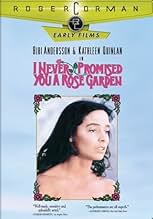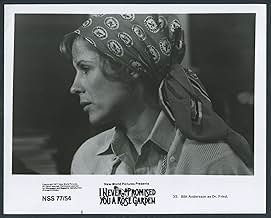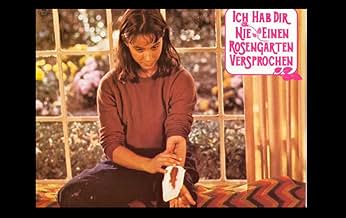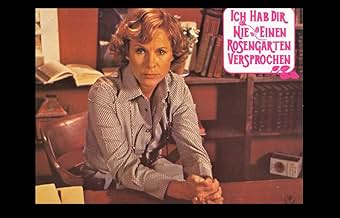Jamais je ne t'ai promis un jardin de roses
Titre original : I Never Promised You a Rose Garden
NOTE IMDb
6,4/10
1,7 k
MA NOTE
Ajouter une intrigue dans votre langueA disturbed, institutionalized 16-year-old girl struggles between fantasy and reality.A disturbed, institutionalized 16-year-old girl struggles between fantasy and reality.A disturbed, institutionalized 16-year-old girl struggles between fantasy and reality.
- Réalisation
- Scénario
- Casting principal
- Nommé pour 1 Oscar
- 4 nominations au total
Karin Collison
- Nurse
- (as Elizabeth Dartmoor)
Barbara Steele
- Idat
- (scènes coupées)
Avis à la une
10Dara-3
Kathleen Quinlan plays Deborah, a very bright girl, who is institutionalized for three years in a psychiatric hospital. Though different from the book in some ways, this keeps the spirit of it quite well and with a much more satisfying ending than the book. Quinlan is a wonderful actress. Deborah, who is diagnosed as a schizophrenic (though she probably wouldn't be today), has a long, torturous journey through her illness. Quinlan makes us believe that she will succeed. In addition, there is a strong cast of mostly women of many ages. I saw this film first when I was a teenager and the problems Deborah faced also resonated with me (despite not being in a hospital). I have never forgotten this film, though it has been out of print on video for many years and can only view it when it occasionally makes it on television. Catch it if you can -- especially if you are a teenage girl or ever were.
If you've already read the book this film is a disappointment. If you haven't read it you are better off skipping the film and getting the book. The film removes too much of the book and basically makes little sense.
The film implies that Deborah's urethral cancer caused her schizophrenia. Which does a disservice to both the book and to the understanding of schizophrenia. Her other world is quite boring in the film and much richer in the book.
The cast is a good one which is why it warrants stars at all. And they do a good job at acting with what they had to work with.
The film implies that Deborah's urethral cancer caused her schizophrenia. Which does a disservice to both the book and to the understanding of schizophrenia. Her other world is quite boring in the film and much richer in the book.
The cast is a good one which is why it warrants stars at all. And they do a good job at acting with what they had to work with.
But there is still a very interesting movie in here with a number of memorable sequences.
The movie is about our protagonist, who to our understanding, is a teenaged girl, who apparently either hallucinates about some bizarre fantasy world (and not in a fun Terry Gilliam way but a seriously bizarre "why would she even consider this superior way?") or merely is in fantasy about it in escaping from reality, it's not explained. It begins as she goes to a mental hospital in the countryside it looks and almost immediately our main character inexplicably stabs herself and gets thrown in a disturbed section as opposed to the initial summer camp section. It is here, where our story follows the rest of the film, a series of up and down spirals and looks at her interactions with the other patients.
The thing about all of this is we never actually get to understand the characters at all. We are never told what they're about, why they feel this way, what their backgrounds are, and why they do what they what they do. They just are, and throughout the whole piece the audience feels like with any of the characters, it never surpasses the point of acquaintment because even, if the characters be developed, they were never characterized in the first place, so it's irrelevant. At the same time, though the movie certainly to its benefit explores the setting and situation in a very visceral way, by the movie's end, everything feels oversaturated, because it feels as though we have spent such time in this setting watching similar things with people that don't really mean much for so long that it just starts to wear thin. When the film end, we aren't really sure why the events have turned out as they did, because we aren't really sure why they were the other way in the first place. It just feels like a breath of fresh air to get a new sense of scenery.
The thing is, though, despite that, the movie is still successful probably because the happenings themselves are rather interesting, the unflinching portrayal has the power to captivate, and there is claustrophobic intensity to the asylum as well as a general heterosexual male (being the viewer) to recessive female women appeal, which really adds a type of close-knit feel with the characters.
So, it's not the most satisfying nor the most well-devised film of its genre out there, but if you be a fan of asylum films, this is definitely worth checking out. I also must note that out of all the mental hospital films out there, this is probably the most intense. This movie is 100% serious and very frightening and unsettling. There's no comedy nor light-heart in this movie. The tone is closer to a horror film (despite that it is a pure dramatic realism) than it is to One Flew Over the Cuckoo's Nest. From that perspective this film is actually very unique.
The movie is about our protagonist, who to our understanding, is a teenaged girl, who apparently either hallucinates about some bizarre fantasy world (and not in a fun Terry Gilliam way but a seriously bizarre "why would she even consider this superior way?") or merely is in fantasy about it in escaping from reality, it's not explained. It begins as she goes to a mental hospital in the countryside it looks and almost immediately our main character inexplicably stabs herself and gets thrown in a disturbed section as opposed to the initial summer camp section. It is here, where our story follows the rest of the film, a series of up and down spirals and looks at her interactions with the other patients.
The thing about all of this is we never actually get to understand the characters at all. We are never told what they're about, why they feel this way, what their backgrounds are, and why they do what they what they do. They just are, and throughout the whole piece the audience feels like with any of the characters, it never surpasses the point of acquaintment because even, if the characters be developed, they were never characterized in the first place, so it's irrelevant. At the same time, though the movie certainly to its benefit explores the setting and situation in a very visceral way, by the movie's end, everything feels oversaturated, because it feels as though we have spent such time in this setting watching similar things with people that don't really mean much for so long that it just starts to wear thin. When the film end, we aren't really sure why the events have turned out as they did, because we aren't really sure why they were the other way in the first place. It just feels like a breath of fresh air to get a new sense of scenery.
The thing is, though, despite that, the movie is still successful probably because the happenings themselves are rather interesting, the unflinching portrayal has the power to captivate, and there is claustrophobic intensity to the asylum as well as a general heterosexual male (being the viewer) to recessive female women appeal, which really adds a type of close-knit feel with the characters.
So, it's not the most satisfying nor the most well-devised film of its genre out there, but if you be a fan of asylum films, this is definitely worth checking out. I also must note that out of all the mental hospital films out there, this is probably the most intense. This movie is 100% serious and very frightening and unsettling. There's no comedy nor light-heart in this movie. The tone is closer to a horror film (despite that it is a pure dramatic realism) than it is to One Flew Over the Cuckoo's Nest. From that perspective this film is actually very unique.
Deborah Blake (Kathleen Quinlan) is admitted to a country institution by her high street parents, unable to cope with the ignominy brought upon them, by her erratic, anti-social behaviour.
Taunted by her inner-demons (to which we're treated inventively from the mind's eye perspective), she's gradually cajoled from her psychosis by the unassuming, yet fiercely determined treating doctor - Bibi Andersson delivering a warm, sympathetic performance and headlining an impressive female cast that includes Signe Hasso, Susan Tyrrell, Diane Varsi, Silvia Sidney, screenwriter /actress Darlene Craviotto and taking a short break from her maternal duties on Martha's Vineyard, Lorraine Gary.
Along the journey, there's a couple of plot diversions, some poignant, others hackneyed and exploitative, but then would New World Pictures ever have distributed this movie without a stereotypical bully nurse scenario? Unlikely.
The Roger Corman production combines cinematic liberties with an at-times reverent translation of the Hannah Green novel, creating a compelling B-movie possessing an unusual dramatic-fantasy film tone. A cynical viewer might postulate that Corman saw a payday following the success of "One Flew Over the Cukoo's Nest", and to a large extent, this remains exploitative cinema. That said, Quinlan's performance clearly defies that brand, her characterisation personifies trauma and whilst often intense, isn't overcooked.
You have to commend New World Pictures for taking the plunge with this release against type, especially when you consider the other titles in their production line and catalogue at the time; 'Rose Garden' is a very different breed to your typical locally made New World Picture. Not perfect by any means and does have a tendency to stigmatise the subject matter, nevertheless an enjoyable film in spite of its flaws.
Taunted by her inner-demons (to which we're treated inventively from the mind's eye perspective), she's gradually cajoled from her psychosis by the unassuming, yet fiercely determined treating doctor - Bibi Andersson delivering a warm, sympathetic performance and headlining an impressive female cast that includes Signe Hasso, Susan Tyrrell, Diane Varsi, Silvia Sidney, screenwriter /actress Darlene Craviotto and taking a short break from her maternal duties on Martha's Vineyard, Lorraine Gary.
Along the journey, there's a couple of plot diversions, some poignant, others hackneyed and exploitative, but then would New World Pictures ever have distributed this movie without a stereotypical bully nurse scenario? Unlikely.
The Roger Corman production combines cinematic liberties with an at-times reverent translation of the Hannah Green novel, creating a compelling B-movie possessing an unusual dramatic-fantasy film tone. A cynical viewer might postulate that Corman saw a payday following the success of "One Flew Over the Cukoo's Nest", and to a large extent, this remains exploitative cinema. That said, Quinlan's performance clearly defies that brand, her characterisation personifies trauma and whilst often intense, isn't overcooked.
You have to commend New World Pictures for taking the plunge with this release against type, especially when you consider the other titles in their production line and catalogue at the time; 'Rose Garden' is a very different breed to your typical locally made New World Picture. Not perfect by any means and does have a tendency to stigmatise the subject matter, nevertheless an enjoyable film in spite of its flaws.
10rrrusty
I agree completely with Dara. I was 20 when I saw it and I would recommend reading the book first, which gives you the background for Deborah's dreamlife. The film can't even begin to show the cruel beauty of her inner world, and (perhaps appropriately) omits any reference to her ethnic and familial demons.
When I think of this movie, I see the look in Kathleen Quinlan's eyes. Her performance is precocious and utterly...amazing, especially for an actress just into her 20's. She seems possessed, wholly inhabited by the character of Deborah, and her scenes with Bibi Andersson are magical. I would credit the director and cinematographer with the wonderful feel of the movie, but Quinlan's portrayal of a young girl marooned in a parallel universe of her mind's own devising is timeless.
When I think of this movie, I see the look in Kathleen Quinlan's eyes. Her performance is precocious and utterly...amazing, especially for an actress just into her 20's. She seems possessed, wholly inhabited by the character of Deborah, and her scenes with Bibi Andersson are magical. I would credit the director and cinematographer with the wonderful feel of the movie, but Quinlan's portrayal of a young girl marooned in a parallel universe of her mind's own devising is timeless.
Le saviez-vous
- AnecdotesThe lead female role of of Deborah Blake in this picture was previously intended for Natalie Wood who had unrealized plans to both produce and star in the movie. Wood once had planned to produce the picture as well as star in it in the role of Deborah Blake but those plans never materialized. The part in the end was played in the film by Kathleen Quinlan.
- GaffesIn the New Year's Eve party scene, Deborah is seen with loose hair talking to Dr. Fried and then there is a close-up of Deborah with her hair pulled back from her forehead.
- Citations
Deborah Blake: You can turn me off, you know. You can go off with your friends and write another paper on schizophrenia and get an award for it. But I can't turn me off. So I'm calling off the fight.
Dr. Fried: So you quit. Stay in the nuthouse for the rest of your life.
Meilleurs choix
Connectez-vous pour évaluer et suivre la liste de favoris afin de recevoir des recommandations personnalisées
- How long is I Never Promised You a Rose Garden?Alimenté par Alexa
Détails
- Date de sortie
- Pays d’origine
- Site officiel
- Langue
- Aussi connu sous le nom de
- I Never Promised You a Rose Garden
- Sociétés de production
- Voir plus de crédits d'entreprise sur IMDbPro
Contribuer à cette page
Suggérer une modification ou ajouter du contenu manquant

Lacune principale
By what name was Jamais je ne t'ai promis un jardin de roses (1977) officially released in India in English?
Répondre





















